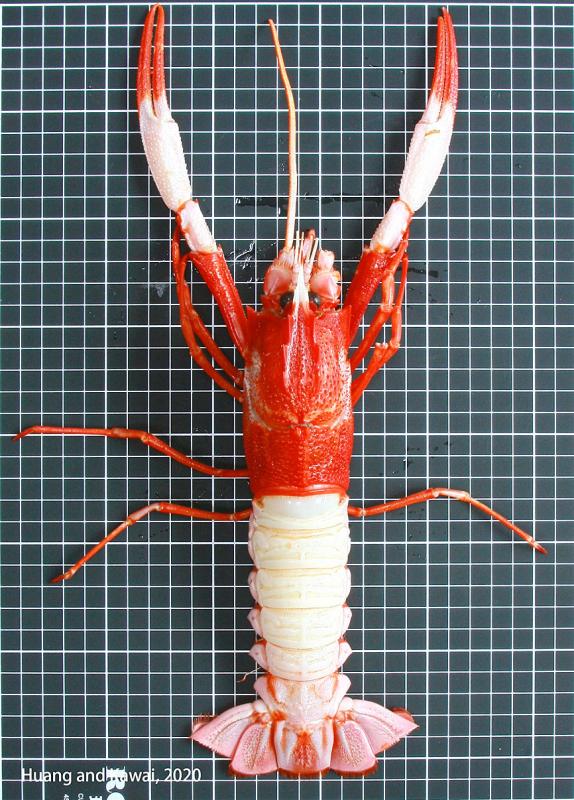A lobster species rarely caught by local fishers earlier this month was included for the first time on TaiBNET (Catalogue of Life in Taiwan) maintained by the Biodiversity Research Center at Academia Sinica, thanks to a biologist.
Huang Ming-chih (黃銘志), an associate professor in the Department of Biological Sciences and Technology at National University of Tainan, acquired 10 Neptune lobsters (Metanephrops neptunus) from fishers at Cheng Pin port in Keelung, the school said in a statement released on Thursday.
The lobsters were caught in waters close to the Pratas Islands (Dongsha Islands, 東沙群島) in the South China Sea in July last year, the statement said.

Photo: CNA
Known locally as red-head lobsters, the lobsters are rarely seen among the catches of local fishers, with fewer than 40 caught each year and they are one of the most expensive items sold at Keelung seafood market, it said.
Of the 10 lobsters Huang acquired, three were ovigerous females and seven mature males, which facilitated more detailed research into the species, it added.
Relatively little is known about the species, and only minimal research has previously been conducted domestically or internationally, Huang told the Central News Agency.
Registering the lobster on TaiBNET represents the first step in seeking to protect the species, he said.
Huang thanked Tadashi Kawai, chief researcher at the Hokkaido Research Organization, part of Japan’s Central Fisheries Research Institution, for his assistance in identifying the rare species, recording its features and providing pictures.
An article based on their joint observations has been published in the latest edition of Crustacean Research.
The 10 Neptune lobsters have since been donated to National Taiwan Museum in Taipei as specimens for academic researchers to use in their work, Huang said.
The Neptune lobster, which has a red head and white abdomen, was first discovered in the South China Sea in 1965.
It is 18cm to 25cm in length and is mainly found at a depth of 300m to 600m in the South China Sea and the Indian Ocean west of Australia.

Chinese Nationalist Party (KMT) Chairman Eric Chu (朱立倫), spokeswoman Yang Chih-yu (楊智伃) and Legislator Hsieh Lung-chieh (謝龍介) would be summoned by police for questioning for leading an illegal assembly on Thursday evening last week, Minister of the Interior Liu Shyh-fang (劉世芳) said today. The three KMT officials led an assembly outside the Taipei City Prosecutors’ Office, a restricted area where public assembly is not allowed, protesting the questioning of several KMT staff and searches of KMT headquarters and offices in a recall petition forgery case. Chu, Yang and Hsieh are all suspected of contravening the Assembly and Parade Act (集會遊行法) by holding

PRAISE: Japanese visitor Takashi Kubota said the Taiwanese temple architecture images showcased in the AI Art Gallery were the most impressive displays he saw Taiwan does not have an official pavilion at the World Expo in Osaka, Japan, because of its diplomatic predicament, but the government-backed Tech World pavilion is drawing interest with its unique recreations of works by Taiwanese artists. The pavilion features an artificial intelligence (AI)-based art gallery showcasing works of famous Taiwanese artists from the Japanese colonial period using innovative technologies. Among its main simulated displays are Eastern gouache paintings by Chen Chin (陳進), Lin Yu-shan (林玉山) and Kuo Hsueh-hu (郭雪湖), who were the three young Taiwanese painters selected for the East Asian Painting exhibition in 1927. Gouache is a water-based

Taiwan would welcome the return of Honduras as a diplomatic ally if its next president decides to make such a move, Minister of Foreign Affairs Lin Chia-lung (林佳龍) said yesterday. “Of course, we would welcome Honduras if they want to restore diplomatic ties with Taiwan after their elections,” Lin said at a meeting of the legislature’s Foreign Affairs and National Defense Committee, when asked to comment on statements made by two of the three Honduran presidential candidates during the presidential campaign in the Central American country. Taiwan is paying close attention to the region as a whole in the wake of a

OFF-TARGET: More than 30,000 participants were expected to take part in the Games next month, but only 6,550 foreign and 19,400 Taiwanese athletes have registered Taipei city councilors yesterday blasted the organizers of next month’s World Masters Games over sudden timetable and venue changes, which they said have caused thousands of participants to back out of the international sporting event, among other organizational issues. They also cited visa delays and political interference by China as reasons many foreign athletes are requesting refunds for the event, to be held from May 17 to 30. Jointly organized by the Taipei and New Taipei City governments, the games have been rocked by numerous controversies since preparations began in 2020. Taipei City Councilor Lin Yen-feng (林延鳳) said yesterday that new measures by